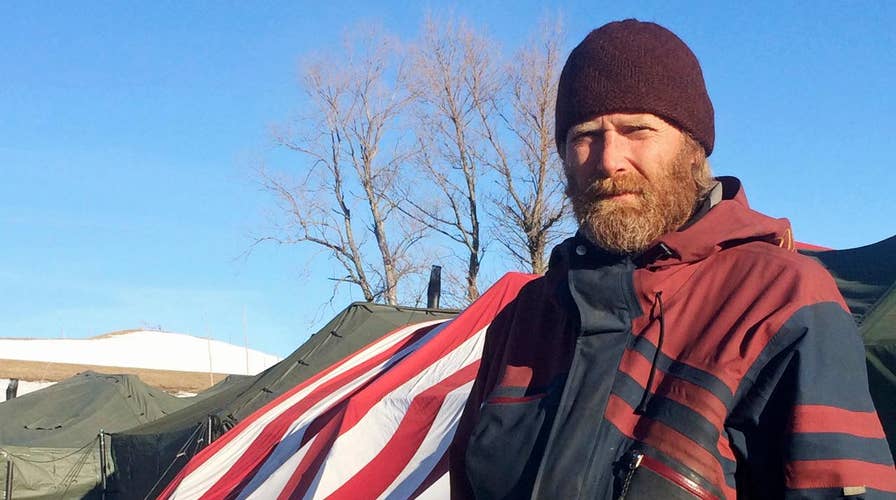Deadline passes for Dakota pipeline protesters to evacuate
Some activists decline to leave the campsite
CANNON BALL, N.D – After seven months of protests, beating drums, freezing nights and canned chili, police began to shut down campsites once occupied by tens of thousands of environmentalists and Native Americans fighting the North Dakota Access Pipeline project.
Most of the 200 to 300 protesters who remained at the encampment walked out around 1 p.m. local time Wednesday. That was about an hour ahead of a deadline set by the U.S. Army Corps of Engineers for the camp to close ahead of a spring flooding threat.
Law enforcement officials said nine people were later arrested in a confrontation outside the protest camp.
North Dakota Highway Patrol Lt. Tom Iverson said the protesters taken into custody were among a group of several dozen people who began taunting officers. Iverson said they were arrested for not obeying law enforcement commands.
Between 50 to 75 people still remain at the site, but police plan no further action Wednesday.
At least one person was injured after protesters set fire to a handful of wooden structures at the makeshift campsite.
Cecily Fong, a spokeswoman for the state Department of Emergency Services, says the extent of the unidentified female's injuries weren't known. Fong said an ambulance was being sent to the encampment.
The protesters, who came to the rolling hills of North Dakota from around the world to rally against a 1,100-mile oil pipeline, made their point. Their protest prompted then-President Barack Obama to halt construction, forcing the U.S. Army Corps of Engineers to review the project’s environmental assessment.
But their victory turned to defeat with the election of Donald Trump, who reversed the decision. Last month, the Corps issued the final easement, allowing Energy Transfer Partners to initiate drilling under the Missouri River. That continues today and company officials say oil could be flowing in as little as two months.
PIPELINE PROTESTERS SET FIRES AHEAD OF CAMP CLOSING
Prompted by an unusually warm winter, on Feb. 2 North Dakota Gov. Doug Burgum issued an emergency order for the protestors to leave their campsites on the banks of the Cannonball River by 2 p.m. Wednesday. The campsites were built in the flood plain and the river is expected to rise another five feet by May 1.
Public safety is one concern; public health is the other.
What was once a bustling makeshift city is now a largely abandoned garbage pit. Teepees and yurts, thousands of sheets of plywood and tents, kerosene and propane stoves, diesel and gasoline generators, food, clothing, cars and mountains of human waste lie in what was once a pristine floodplain that abutted the Standing Rock Sioux Reservation.
Nothing but bison and horses roamed here. Unless the debris is moved, state officials say it will wash into and contaminate the Missouri River.
Already 250 loads of trash have been removed, but much more remains. And police say they need to get everyone out to finish the job.
It wasn't known where the protesters were headed, but authorities had several buses ready to carry them to Bismarck for food, lodging and help getting home. Some protesters have vowed to camp elsewhere on private land.
Related slideshow:
POPE WEIGHS IN ON DAKOTA PIPELINE DISPUTE: NATIVE PEOPLE HAVE RIGHTS OVER THEIR LANDS
A few protesters told Fox News they did not think their efforts were in vain.
“I’d like people who see this to not be apathetic. To feel that it means something,” said Dave Cooley of Vets for Peace. “These are real people with real lives. Think of what would happen to the individual who lives in the Twin Cities or Bismarck or Los Angeles – if the same kinds of things were perpetrated on them, how would they feel?”
Protesters said not only did they deliver a strong message to the world – but they also made some good friends in the process.
“I formed a family here with the people around me. I love them very dearly,” said Josh, a protester from Pennsylvania who would not give his last name. “I’m filled with so much emotion right now seeing everyone take apart their camps and seeing everyone, I watched a bunch of my friends leave here.”
Fox News' Melissa Chrise and The Associated Press contributed to this report.










































